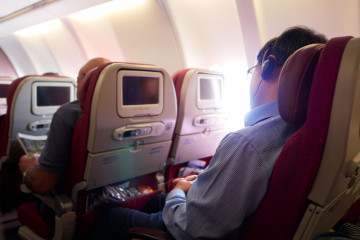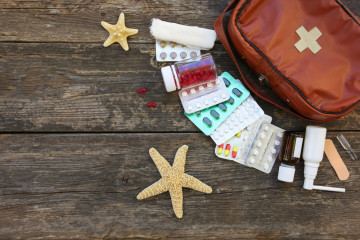Whether you travelling for business or pleasure, the last thing you want to feel when you get off a flight is sluggish, bloated or run down. In an ideal world, you’ll want to stay hydrated and fill up on nutritious foods that are easy to digest. But airplane travel can be stressful, rushed and long, so you might not always be able to stay on track with the right diet. We spoke to nutritionists about the best foods to eat before, during and after a long flight.
What should you eat before boarding a flight?
At 4,00,000ft, the air pressure is way lower than it is at sea level. As the pressure falls while you fly, gas starts to expand, which is why your stomach can feel uncomfortable. Plus, being in an enclosed space with so many other people can leave your immune system susceptible. “The Aerospace Medical Association says our body’s gas can expand up to 25 per cent while in flight. So it’s better to opt for light, easy meals before boarding, especially if you have a long commute,” advises celebrity dietician Nmami Agarwal. “Your meals before flights should avoid sugar, be moderate in protein, and be chock-full of slow burning complex carbohydrates”. She promotes grabbing a fruit before you head to the airport. “A banana is your best bet before boarding a flight. The fruit is loaded with potassium, which can regulate blood pressure and help ease any muscle cramps you face during a flight. Consider oranges too, since they are rich in Vitamin C, which helps to boost immunity. Make a smoothie by blending your favourite fruits like green apple or kiwi with almond milk. I also like to load up on water and coconut water a few hours before flying to really improve hydration levels.”
“If your flight is in the afternoon or evening, eat a small balanced meal to satiate you,” says Agarwal. You’ll want to consume something with protein, so eggs or fish work well. A salad with good fats like avocado and nuts will also create a well-rounded meal. Avoid legumes and spices—they could irritate the gut further—and try reducing caffeine consumption through coffee or aerated drinks. They’re hard on your digestion and can keep you up when you should be catching up on rest.
What to eat when you’re on the plane
The first and foremost important thing to follow is to keep yourself well hydrated, before during and after a flight. “Having a bottle of water on hand is the easiest way to do it, but you could also infuse lemon, cucumber, green apple or mint to regular water and DIY your very own infused concoction. This will not only ensure hydration, but also provide you with the necessary antioxidants,” states Agarwal.
Carrying your own food and snacks on the flight is ideal, as most airplane food have preservatives and high salt content. Nutrition consultant Sangeeta Khanna prefers to not be at the mercy of an in-flight airline meal when on long haul flights. “Carry some nuts in a small container. I prefer soaked, but roasted ones also work,” she says. From the in-flight food options, she recommends choosing hydrating foods and passing over the breads, cookies and cakes. “Remember that your intake of water should be more than coffee or alcohol because they are diuretics. Instead of one glass at a time, have frequent sips of water. Juices are good, as are iced teas. Many people drink alcohol on flights, but that can dehydrate you further.” Snacks high in salt can cause your body to hold on to water leading to water retention, which can feel uncomfortable while flying. Agarwal warns that your perception of salty and sweet tastes drops by almost around 30 per cent inside a flight, but drinking water can counteract this and help reactivate your taste buds.
What to eat after the flight
Sleep deprivation after a long flight can leave you feeling exhausted. Agarwal lists a few options that help the body bounce back. “Rich in antioxidants, Matcha Green Tea gives you an energy boost that can last for up to three to four hours. Bananas and dark chocolates are also great post-flight snack options as they help to ease tiredness and relax the muscles. A decoction of ginger in warm water addresses your digestive issues as well,” she says. Most nutritionists suggest loading up on antioxidant-rich fruits and vegetables to boost the immune system, like berries and grapes. Protein is ideal as well, so choose almond butter with crackers, cheese, yoghurt and nuts to keep the energy levels up.


